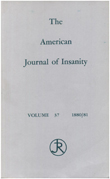Alcohol and aldehyde dehydrogenase polymorphisms and the risk for alcoholism
Abstract
OBJECTIVE: The authors studied a large number of Japanese alcoholic patients and comparison subjects to establish the genotype frequencies of alcohol dehydrogenase-2 (ADH2) and mitochondrial aldehyde dehydrogenase (ALDH2) and to quantify the relative risk for alcoholism from the results. METHOD: The subjects were 655 alcoholic patients and 461 comparison subjects. ADH2 and ALDH2 were genotyped by the combination of polymerase chain reaction and hybridization methods. RESULTS: Active ALDH2 and usual ADH2 were significantly more frequent in the alcoholic patients. Inactive ALDH2 was not always associated with a low risk of alcoholism, and active ALDH2 was not always associated with high risk. In individuals with heterozygous inactive ALDH2 and usual ADH2, the odds ratio for alcoholism was high. CONCLUSIONS: The risk for alcoholism in Japanese has been accurately estimated on the basis of the genotype frequencies of ADH2 and ALDH2. Many Japanese may be protected from alcoholism by inactive ALDH2 and by higher frequencies of atypical ADH2.
Access content
To read the fulltext, please use one of the options below to sign in or purchase access.- Personal login
- Institutional Login
- Sign in via OpenAthens
- Register for access
-
Please login/register if you wish to pair your device and check access availability.
Not a subscriber?
PsychiatryOnline subscription options offer access to the DSM-5 library, books, journals, CME, and patient resources. This all-in-one virtual library provides psychiatrists and mental health professionals with key resources for diagnosis, treatment, research, and professional development.
Need more help? PsychiatryOnline Customer Service may be reached by emailing [email protected] or by calling 800-368-5777 (in the U.S.) or 703-907-7322 (outside the U.S.).



